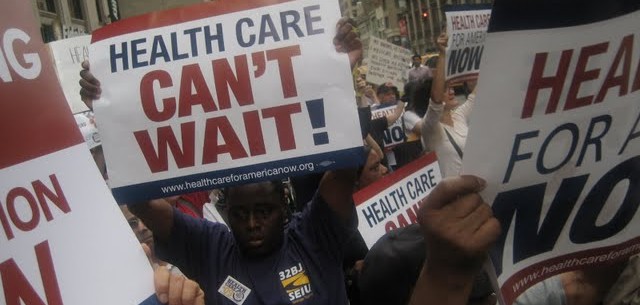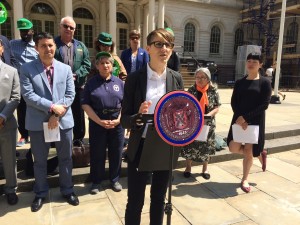Members of the People’s Budget Coalition for Public Health gathered for a press conference on the steps of City Hall on May 13th to respond to Mayor de Blasio’s recently-released budget for the city’s coming fiscal year and urge that the City Council build on it to address additional unmet needs of New Yorkers. They laid out broad priorities to guide the Mayor and Council as they now enter into negotiations, to be concluded by the end of June. PBC’s priorities include: community-based health planning, addressing health disparities, expanding the health care safety net, and investing in the city’s municipal hospital and public health system.
“The Executive Budget takes many steps in the right direction, but needs to do more to address the social determinants of health and disparities; and create a health care system rooted in our neighborhoods and communities,” said Anthony Feliciano, Director of the Commission on the Public’s Health System, “A successful health care system results from a prescription that includes access, quality, services, fairness, equity, and community. If one element is missing, the prescription does not work. Over the years, too many communities have been consistently left out of planning, or left with substandard care, or no care at all. Often the factors in determining those left behind are income, race, ethnicity, immigration status, disability status, gender identity, primary language, and sexual orientation. We know the Mayor and Council understand this reality, and urge them to support some of our health priorities to address these problems.”
“We commend Mayor de Blasio and Health Commissioner Mary Bassett for prioritizing public health activities aimed at communities that have the disproportionate share of physical and mental illness and premature death,” said Esther W. Y. Lok, Assistant Director of Policy, Advocacy and Research from the Federation of Protestant Welfare Agencies. “Engaging local residents, community and faith leaders, institutions, unions, and elected officials in the planning process is essential to the expansion of public health initiatives,”
As New York State implements the Affordable Care Act (ACA) and a recently-approved $8 billion dollar Medicaid Waiver, PBC members said it is critical that the City maintains and strengthens a public health care infrastructure that ensures continuous, high quality care delivery to those who are newly-insured as well as those left uninsured. Even with the leveling benefits of federal health reform, many New Yorkers and their communities continue to face disparities in access, distribution, and coordination of health resources.
The group called for the creation of a new “Access Health NYC” program, to provide city funding to community-based organizations to help connect uninsured people to new coverage options and/or access to services.
“While New York has done very well enrolling uninsured people into new coverage options available under the Affordable Care Act, we know there are still hundreds of thousands of uninsured across our city who still haven’t done so,” said Mark Hannay, Director of the Metro New York Health Care for All Campaign. “On-the-ground community-based organizations are the key to engaging hard-to-reach populations, and they need the resources to go out there and find the still uninsured, inform them about the law, and get them enrolled in coverage, all in culturally appropriate ways. Unfortunately, the state government chose not to fund community outreach programs, so this is an important gap that our city government can fill to make sure that all New Yorkers get health insurance.”
“Collaborative and culturally appropriate outreach services that connect people with care are very important”, said Suki Terada Ports, Vice President of the Japanese American Association of New York, “In an example of historic significance, Korean and Japanese not-for-profits worked together to enable people of Japanese ancestry to obtain health insurance. Korean Community Services stepped up to the plate to help educate and enroll limited English speaking people in New York and New Jersey because neither state had arranged for a Navigator who spoke Japanese.”
“We urge the administration to remember that the Affordable Care Act left health care reform incomplete for New York City’s undocumented residents,” said Jackie Vimo, Policy Director for the New York Immigration Coalition. “New York City immigrants and their families have options that they may not know about including services through NYC’s Health and Hospitals Corporation facilities, federally qualified health centers, and Emergency Medicaid. We look forward to working with the administration to educate immigrants in New York City about services and programs that are available to them and to crafting a durable policy solution to facilitate health care access for all New York City residents.”
“We are grateful that the Mayor’s budget outlines progressive health measures. However, more needs to be done to address health inequities and disparities,” said Noilyn Abesamis-Mendoza, Health Policy Director for the Coalition for Asian American Children & Families. “Initiatives such as Access Health NYC would greatly expand health access and services to various communities in a culturally- and linguistically-competent manner, while improved community health planning will ensure that those on the receiving end of health programs have greater agency and self-determination of healthcare resources.
The group also called for budget provisions to grow public health care infrastructure from the communities it serves. They said New York’s health system must serve all New Yorkers; enabling everyone to receive high quality, accessible health care services in their own neighborhoods. PBC called for the Mayor and City Council to put forward a vision for public health that is rooted in community input, addresses health disparities facing New York’s more marginalized neighborhoods through the stabilization of the safety net, and further builds and expands the city’s current public health infrastructure and workforce.
“Being an individual who has worked in Federal, State, City and Privately-Funded Health and Human Services programs, it is glaringly obvious that there needs to be an even larger increase in local control over, and participation in, the decisions around health care resources and public health issues,” said Stephen Beasley, Program Coordinator for CAMBA/Greater Brooklyn Health Coalition.
“Thanks in large part to the inclusive approach of Mayor de Blasio toward our safety-net hospitals and the diligent work of healthcare advocates across the City, New York has the opportunity with this year’s budget to address health disparities that have long plagued struggling New Yorkers and focus on meaningful quality improvement measures that matter to our patients and communities,” said Dr. Matthews Hurley, Vice President of Doctors Council SEIU. “We are proud to stand with our partners in the People’s Budget Coalition and look forward to working with health care professionals, community members, patients and Mayor de Blasio to ensure New York City is the best provider of care to our loved ones.”

